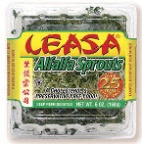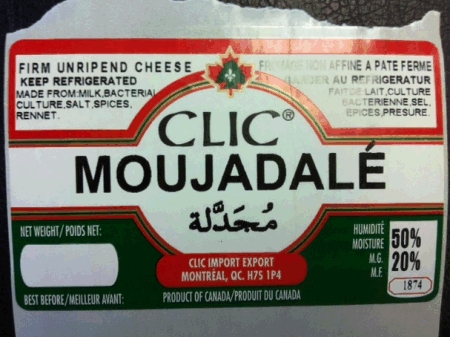People who forgot to mention they had eaten sprouts may have thrown disease trackers off the trail as they sought to trace the source of the deadly strain of E. coli that sickened more than 4,300 people and killed at least 50 in Europe this year, according to a study published in the New England Journal of Medicine.
While a definitive genetic link remains elusive, three separate lines of investigation point to sprouts as the means by which the deadly O1O4:H4 strain of the bacteria was spread, researchers led by Udo Buchholz at the Robert Koch Institute in Berlin, Germany’s disease-control agency.
Buchholz and colleagues wrote, “The one dish that frequently exposed guests to sprouts was the side salad, which contained tomatoes, cucumbers, three sorts of leaf salads, and sprouts. Sprouts .jpg) may have been the ingredient that visitors recalled least in such a mixed salad.”
may have been the ingredient that visitors recalled least in such a mixed salad.”
Buchholz and colleagues conducted three studies in parallel. The first involved asking patients hospitalized with E. coli infection about their recent food consumption, and comparing that with food eaten by uninfected people. It found that “the only significant variable was sprouts.”
The second study identified 10 groups of diners who ate at a restaurant in Luebeck between May 12 and 16. It found that among 115 people who had been served sprouts, 31 fell ill, compared with none of those who had not eaten sprouts.
The third investigation traced 41 clusters of infections to a producer in Lower Saxony, who grew sprouts from seeds that came from a “supplier X,” Buchholz and colleagues wrote, without identifying either the producer or the supplier. A European Commission task force said in July that the sprouts were probably grown from fenugreek seeds imported from Egypt in 2009. The researchers still don’t know whether the seeds were contaminated before, during or after export from Egypt.
In an accompanying editorial, Martin J. Blaser, M.D. from the Departments of Medicine and Microbiology, New York University, writes the chain of transmission appears to have begun in Egypt, with fecal contamination of fenugreek seeds by either humans or farm animals during storage or transportation, perhaps as long ago as 2009. The seeds then went to a European distributor and from there to farms in several countries. During sprout germination, bacteria multiplied and moved from farm to restaurants and consumers, as Buchholz et al. extensively .jpg) detail in their study. The evidence for such a series of events is compelling, even though the organism was not identified at the earliest steps, since the trail often is cold in point-source outbreaks by the time investigators are able to conduct trace-back investigations.
detail in their study. The evidence for such a series of events is compelling, even though the organism was not identified at the earliest steps, since the trail often is cold in point-source outbreaks by the time investigators are able to conduct trace-back investigations.
German outbreak of Escherichia coli O104:H4 associated with sprouts
26.oct.11
The New England Journal of Medicine
Udo Buchholz, M.D., M.P.H., Helen Bernard, M.D., Dirk Werber, D.V.M., Merle M. Böhmer, Cornelius Remschmidt, M.D., Hendrik Wilking, D.V.M., Yvonne Deleré, M.D., Matthias an der Heiden, Ph.D., Cornelia Adlhoch, D.V.M., Johannes Dreesman, Ph.D., Joachim Ehlers, D.V.M., Steen Ethelberg, Ph.D., Mirko Faber, M.D., Christina Frank, Ph.D., Gerd Fricke, Ph.D., Matthias Greiner, D.V.M., Ph.D., Michael Höhle, Ph.D., Sofie Ivarsson, M.Sc., Uwe Jark, D.V.M., Markus Kirchner, M.D., M.P.H., Judith Koch, M.D., Gérard Krause, M.D., Ph.D., Petra Luber, Ph.D., Bettina Rosner, Ph.D., M.P.H., Klaus Stark, M.D., Ph.D., and Michael Kühne, D.V.M., Ph.D.
http://www.nejm.org/doi/full/10.1056/NEJMoa1106482?query=featured_home
Human infection with Shiga-toxin–producing Escherichia coli is a major cause of postdiarrheal hemolytic–uremic syndrome. This life-threatening disorder, which is characterized by acute renal failure, hemolytic anemia, and thrombocytopenia, typically affects children under the age of 5 years. Shiga-toxin–producing E. coli O157 is the serogroup that is most frequently isolated from patients with the hemolytic–uremic syndrome worldwide.1
In May 2011, a large outbreak of the hemolytic–uremic syndrome associated with the rare E. coliserotype O104:H4 occurred in Germany.2-5 The main epidemiologic features were that the peak of the epidemic was reached on May 21 and May 224,5 and that the vast majority of case subjects either resided or had traveled in northern Germany. Almost all patients from other European countries or from North America had recently returned from northern Germany.2,6,7 Of the affected case subjects, 90% were adults, and more than two thirds of case subjects with the hemolytic–uremic syndrome were female.4
Early studies in Hamburg suggested that infections were probably community-acquired and were not related to food consumption in a particular restaurant. A first case–control study that was conducted on May 23 and 24 suggested that raw food items, such as tomatoes, cucumbers, or leaf salad,3 were the source of infection. The consumption of sprouts, which was previously implicated in outbreaks of Shiga-toxin–producing E. coli in the United States8 and Japan,9 was mentioned by only 25% of case subjects in exploratory interviews, so consumption of sprouts was not tested analytically.
This report describes the investigations that were conducted by the federal agencies under the auspices of the German Ministry of Health and the Ministry of Food, Agriculture, and Consumer Protection, as well as by the respective state agencies, to identify the vehicle of infection of this international outbreak.
 the product for a refund or replacement.
the product for a refund or replacement.
 supermarket chains Willys, Hemköp, Prisextraand Tempo.
supermarket chains Willys, Hemköp, Prisextraand Tempo. states: AK, AR, AZ, CA, CT, FL, GA, ID, IL, IN, MI, MN, MO, MS, MT, NC, ND, NH, NJ, NM, OH, OK, OR, SC, SC, TN, TX, WA, WI, and WV.
states: AK, AR, AZ, CA, CT, FL, GA, ID, IL, IN, MI, MN, MO, MS, MT, NC, ND, NH, NJ, NM, OH, OK, OR, SC, SC, TN, TX, WA, WI, and WV..jpg) customers to receive the jalapeños from South Florida Produce.
customers to receive the jalapeños from South Florida Produce. But with lorry salt?
But with lorry salt? 1/8/12.
1/8/12..jpg) safety step, but many peers agreed with the company’s “abundance of caution.”
safety step, but many peers agreed with the company’s “abundance of caution.” several products had been missed. The manufacturer has ceased production at its facilities and the CFIA working with them to make sure other products manufactured by the company are safe to consume.”
several products had been missed. The manufacturer has ceased production at its facilities and the CFIA working with them to make sure other products manufactured by the company are safe to consume.”.jpg) may have been the ingredient that visitors recalled least in such a mixed salad.”
may have been the ingredient that visitors recalled least in such a mixed salad.”.jpg) detail in their study. The evidence for such a series of events is compelling, even though the organism was not identified at the earliest steps, since the trail often is cold in point-source outbreaks by the time investigators are able to conduct trace-back investigations.
detail in their study. The evidence for such a series of events is compelling, even though the organism was not identified at the earliest steps, since the trail often is cold in point-source outbreaks by the time investigators are able to conduct trace-back investigations. with or without headache, are encouraged to consult their doctor and indicate what they have eaten.
with or without headache, are encouraged to consult their doctor and indicate what they have eaten.